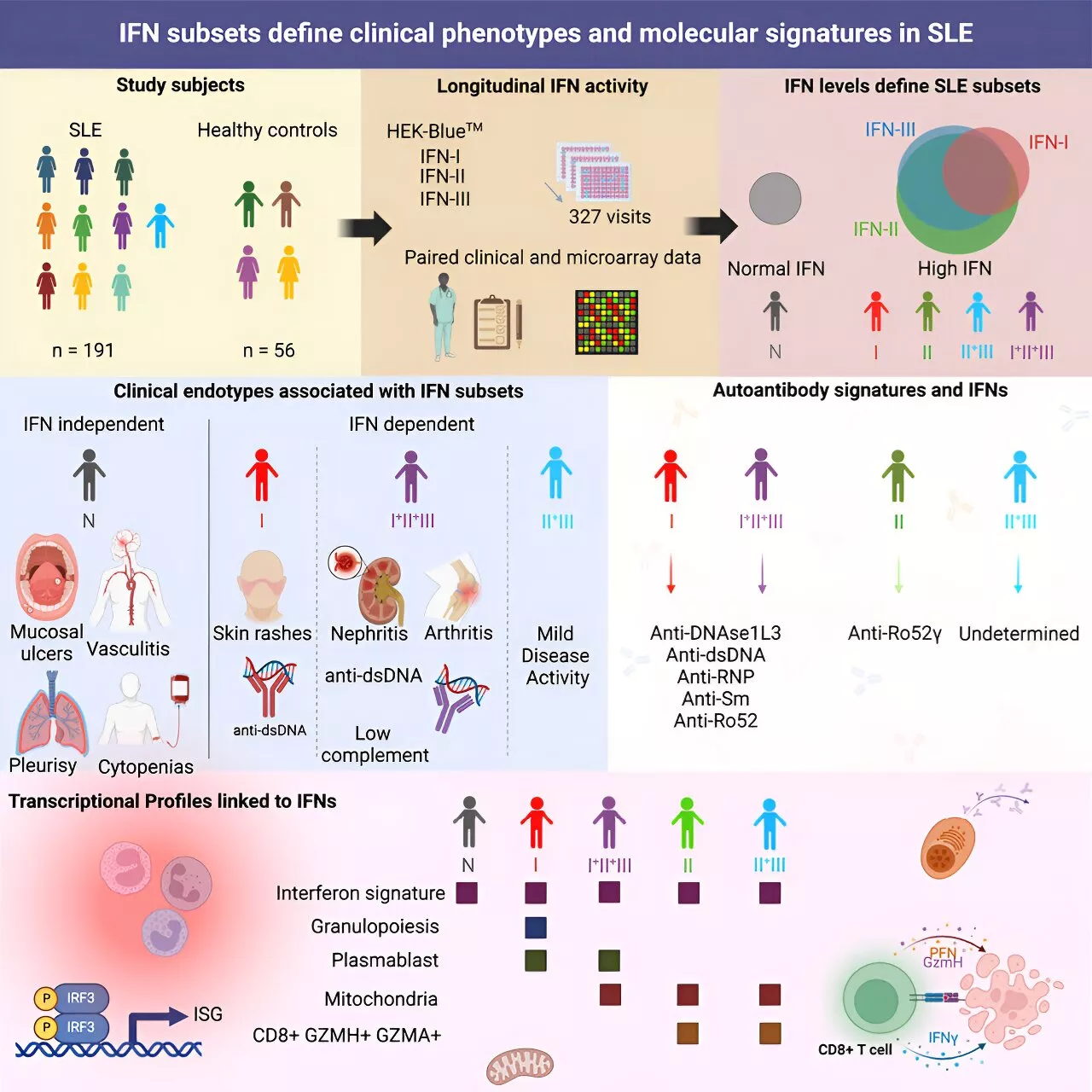In a new study, researchers from Johns Hopkins Medicine say they have uncovered insights as to why lupus symptoms and severity present differently in individuals with the autoimmune condition, which affects up to 1.5 million Americans.
May 14 2024Johns Hopkins Medicine The team says this is a crucial step forward in understanding biological mechanisms behind lupus, and may also lead to shifts in how clinicians treat patients with the condition.
He says this research began with questions about why certain lupus treatments were ineffective for some patients. "We have seen instances where the patient surprisingly didn't improve -; we wondered if certain interferon groups were involved." Researchers were able to use these findings to also make several associations between these interferon combinations and lupus symptoms. In those with elevated interferon I, lupus was mainly associated with symptoms affecting the skin, such as rashes or sores. Participants with elevated levels of interferon I, II and III exhibited the most severe presentations of lupus, often with significant damage to organ systems, such as the kidneys.
Eduardo Gómez-Bañuelos, M.D., Ph.D., rheumatologist, assistant professor of medicine, Johns Hopkins University School of Medicine and study's first and additional corresponding author
Cell Genetic Immune System Inflammation Interferon Interferons Joint Pain Kidney Medicine Pain Ph Skin
South Africa Latest News, South Africa Headlines
Similar News:You can also read news stories similar to this one that we have collected from other news sources.
 Hopkins among greats in new documentary from filmmakers behind Knockout ScousersIn the Company of Kings is the latest production from Steve Read, Robert Douglas and Rob Alexander
Hopkins among greats in new documentary from filmmakers behind Knockout ScousersIn the Company of Kings is the latest production from Steve Read, Robert Douglas and Rob Alexander
Read more »
UK medicine shortages made worse by Brexit, new report findsA NEW report has revealed that medicine shortages across the UK are becoming “the new normal” and are being made worse by Brexit.
Read more »
 New paper examines potential power and pitfalls of harnessing artificial intelligence for sleep medicineIn a new research commentary, the Artificial Intelligence in Sleep Medicine Committee of the American Academy of Sleep Medicine highlights how artificial intelligence stands on the threshold of making monumental contributions to the field of sleep medicine.
New paper examines potential power and pitfalls of harnessing artificial intelligence for sleep medicineIn a new research commentary, the Artificial Intelligence in Sleep Medicine Committee of the American Academy of Sleep Medicine highlights how artificial intelligence stands on the threshold of making monumental contributions to the field of sleep medicine.
Read more »
 New study shows certain combinations of antiviral proteins are responsible for lupus symptomsIn a new study, researchers from Johns Hopkins Medicine say they have uncovered insights as to why lupus symptoms and severity present differently in individuals with the autoimmune condition, which affects up to 1.5 million Americans.
New study shows certain combinations of antiviral proteins are responsible for lupus symptomsIn a new study, researchers from Johns Hopkins Medicine say they have uncovered insights as to why lupus symptoms and severity present differently in individuals with the autoimmune condition, which affects up to 1.5 million Americans.
Read more »
 Study suggests adolescent stress may raise risk of postpartum depression in adultsIn a new study, a Johns Hopkins Medicine-led research team reports that social stress during adolescence in female mice later results in prolonged elevation of the hormone cortisol after they give birth.
Study suggests adolescent stress may raise risk of postpartum depression in adultsIn a new study, a Johns Hopkins Medicine-led research team reports that social stress during adolescence in female mice later results in prolonged elevation of the hormone cortisol after they give birth.
Read more »
 UK, EU face significant medicine shortages: StudyPatients in the UK and European Union are facing shortages of vital medicines such as antibiotics and epilepsy medication, research published Thursday found.
UK, EU face significant medicine shortages: StudyPatients in the UK and European Union are facing shortages of vital medicines such as antibiotics and epilepsy medication, research published Thursday found.
Read more »
